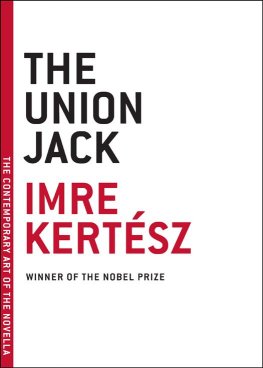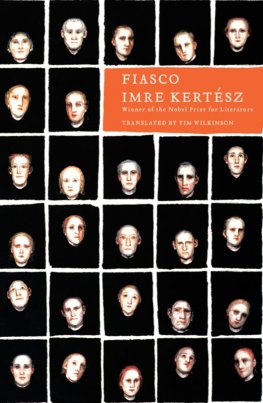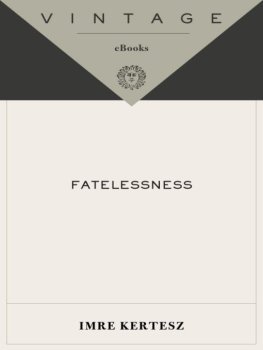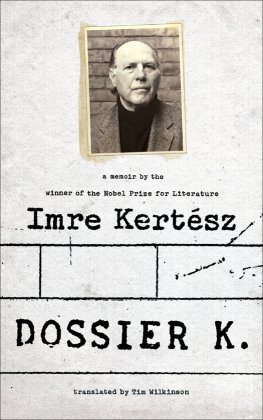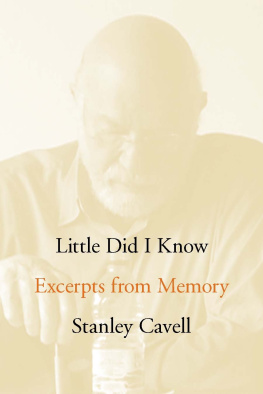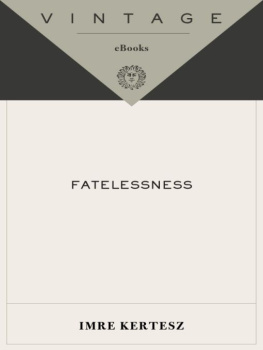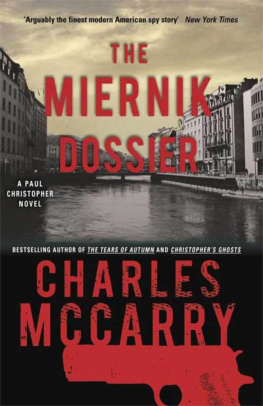Kertész Imre - Dossier K
Here you can read online Kertész Imre - Dossier K full text of the book (entire story) in english for free. Download pdf and epub, get meaning, cover and reviews about this ebook. City: Brooklyn;NY, year: 2013, publisher: Melville House, genre: Science fiction. Description of the work, (preface) as well as reviews are available. Best literature library LitArk.com created for fans of good reading and offers a wide selection of genres:
Romance novel
Science fiction
Adventure
Detective
Science
History
Home and family
Prose
Art
Politics
Computer
Non-fiction
Religion
Business
Children
Humor
Choose a favorite category and find really read worthwhile books. Enjoy immersion in the world of imagination, feel the emotions of the characters or learn something new for yourself, make an fascinating discovery.

- Book:Dossier K
- Author:
- Publisher:Melville House
- Genre:
- Year:2013
- City:Brooklyn;NY
- Rating:4 / 5
- Favourites:Add to favourites
- Your mark:
- 80
- 1
- 2
- 3
- 4
- 5
Dossier K: summary, description and annotation
We offer to read an annotation, description, summary or preface (depends on what the author of the book "Dossier K" wrote himself). If you haven't found the necessary information about the book — write in the comments, we will try to find it.
Dossier K — read online for free the complete book (whole text) full work
Below is the text of the book, divided by pages. System saving the place of the last page read, allows you to conveniently read the book "Dossier K" online for free, without having to search again every time where you left off. Put a bookmark, and you can go to the page where you finished reading at any time.
Font size:
Interval:
Bookmark:
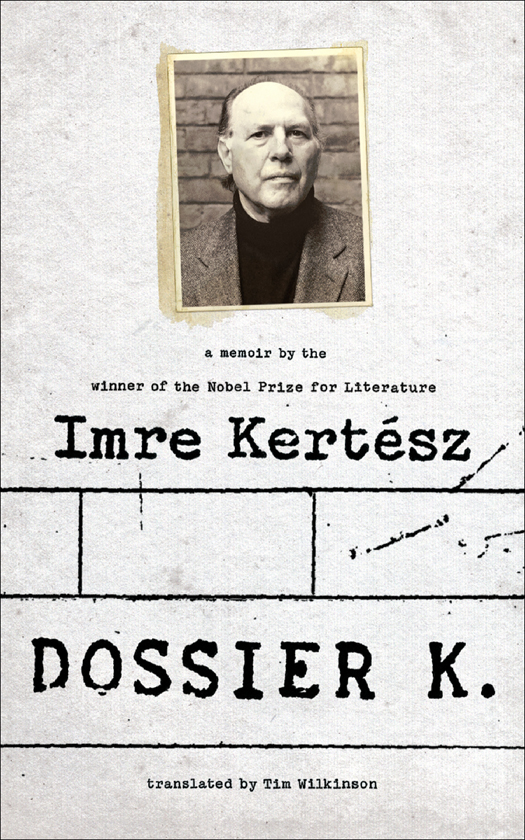
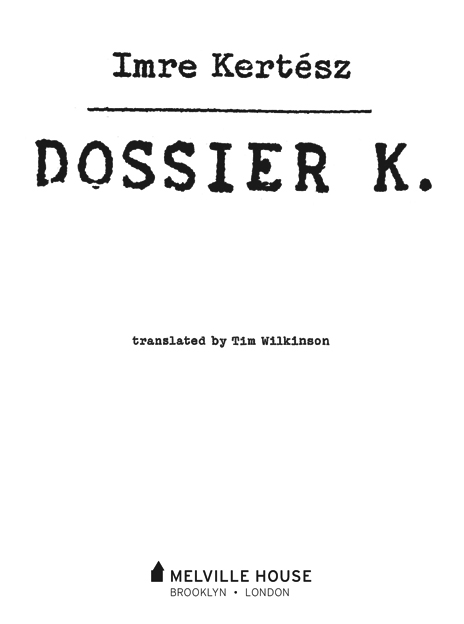
DOSSIER K
Originally published as K. dosszi by Magvet Kiad, Budapest, 2006
2006 Imre Kertsz
Published by permission of Rowohlt Verlag GmbH,
Reinbek bei Hamburg
Translation 2013 Tim Wilkinson
First Melville House printing: April 2013
Melville House Publishing
145 Plymouth Street
Brooklyn, NY 11201
www.mhpbooks.com
eISBN: 978-1-61219-203-1
A catalog record for this title is available from the Library of Congress.
v3.1
The conversation that I conducted with my friend and editor Zoltn Hafner over the course of 2003 and 2004 by way of a so-called in-depth interview filled maybe a dozen magnetic tapes. A file containing a transcript of the edited material caught up with me at my hotel in the little Swiss town of Gstaad. Having looked through the first few sentences, I set the bundle of the manuscript to one side, and with what one might call an involuntary movement opened the lid to my computer That is how this book came into beingthe only one of my books that I have written more because of external prompting than out of any inner compulsion: a veritable autobiography. If one acknowledges Nietzsches proposition that the prototype of the novel as an art form was to be found in the Platonic dialogues, then the Reader is in fact holding a novel in his or her hands.
I. K.
In Fiasco you write: When I was fourteen and a half, through a conjunction of infinitely inane circumstances, I found myself looking down the barrel of a loaded machine gun for half an hour. I suppose that must have happened in the barracks of the gendarmerie. Why was that episode left out of Fatelessness?
From the novels perspective, it was a purely anecdotal element; thats why it had to be left out.
Yet from the perspective of your own life it must nevertheless have been a fairly decisive element
Does that mean Im going to have to say something about things that I never wished to talk about?
Then why did you write about it?
Perhaps precisely so I would not have to talk about it.
Do you find it that difficult?
You know, this is just like the interviews with elderly survivors in that Spielberg series. I hate all those kind of statements like They herded us into the stables They drove us out into a courtyard They took us off to the brick works in Budakalsz, and the like.
Isnt that what happened?
In the novel, yes, it did. But then a novel is fiction
Which in your case I know is based on reality. How was it that you came to be in that narrow courtyard at the gendarmerie barracks?
All things considered, exactly as I described in Fatelessness. In the middle of the nightI was fast asleep, resting against the knees of the person behind me, and the person in front of me was resting against my drawn-up legsI wakened to the sound of shouting and sirens wailing. A minute later and I was standing there, in the yard, under a moonlit sky across which successive squadrons of bomber aircraft were passing. On the low walls, drunken gendarmes were squatting behind machine guns trained on the mass of people who were crowded into the barracks courtyardon us. But theres no point in my telling you this; you can read a much better account of it in Fiasco.
Yes, but there it seems that the boy hasnt a clue about the whole thing, about how he came to be there.
That, in essence, was how it was.
Were you never interested in what I might call the historical background to that scene?
Of course, its just that the circumstances werent so easy
The reality, you mean, not the fiction
I wouldnt draw such a sharp distinction between the two, but lets drop that for now. The trouble was that under the Kdr regime it was extraordinarily difficult to get hold of any documentationparticularly during the Sixties, when I was writing Fatelessness. It was as though they were in cahoots with the Nazi past, the way that all documentation was hidden away: one had to pull out the mostly deficient material from the very back shelves of libraries, and publishing at the time drew a total veil over the past. Nevertheless, I finally managed to piece together that what had lain behind my arrest was a gendarme putsch that had been planned to go ahead in late June 1944. The aim of the putsch, in essence, was to enable the deportation of the Jewish residents of Budapest to Germany to proceed. As we now know, once Horthy saw what the outcome of the Second World War was going to be, and bearing in mind the declaration the Allied powers had made that when the war was over, anybody who had had a hand in the extermination of Jews in Europe was going to be called to account, he ordered a halt to the deportations from Budapest, which was the area over which he had tight control. The gendarmerie wanted to revoke that. As a first step, they threw a ring round Budapest one day at dawn and set up control points at the citys administrative boundaries. As you know, the gendarmeries sphere of action did not extend to the capital: while they were the arm of the law in the provinces, in Budapest it was the boys in blue. Anyway, the gendarmerie somehow managed to pull in the regular police, and on that day the police arrested all the people wearing yellow stars who stepped over the city limits, whether or not a person had a specific permit to do so. That was how I was arrested along with my companions, eighteen of us, all boys of fourteen or fifteen, who were working at the Shell Oil refinery just outside the city limits.
As far as I know, the gendarme putsch eventually failed.
Thats right. Lieutenant General Lszl Faragho, who, alongside His Serene Highness the Regent, was joint head of the gendarmerie, got notice of the brewing putsch in time, and for his part, he concentrated the regular army troops under his command and duly won the gendarmes round to giving up their plan.
But by then they had caught you. Did that also happen the way you described it in Fatelessness?
Exactly so.
So, it was the reality that you wrote down after all. Why are you so insistent on the term fiction?
Look here, thats a pretty basic issue. A couple of decades later, when I decided that I was going to write a novel, I was obliged to sort out, for my personal use so to say, what the difference was between the genres of the novel and the autobiography, memoirs, if only to stop me from adding yet another book to what already back in Sixties had swollen into a library of, how should I put it
Holocaust literature. Isnt that what you wanted to say?
Yes, thats what its called nowadays. Back then, in the Sixties, the word Holocaust wasnt familiar; it only came into use later onand incorrectly at that. Ive just recalled what it was called back then: Lager literature.
Thats a better classification?
Lets not get into considering the point now.
Agreed, but we shall come back to it later on. What would be of more interest to me right now is the difference between fiction and autobiography, as critics and readers alike commonly refer to Fatelessness as an autobiographical novel.
Incorrectly, I have to say, because no such genre exists. A book is either autobiography or a novel. If its autobiography you evoke the past, you try as scrupulously as possible to stick to your recollections; its a matter of extraordinary importance that you write everything down exactly the way it happened, as its usually put: that you dont varnish the facts one little bit. A good autobiography is like a document: a mirror of the age on which people can depend. In a novel, by contrast, its not the facts that matter, but precisely what you add to the facts.
Font size:
Interval:
Bookmark:
Similar books «Dossier K»
Look at similar books to Dossier K. We have selected literature similar in name and meaning in the hope of providing readers with more options to find new, interesting, not yet read works.
Discussion, reviews of the book Dossier K and just readers' own opinions. Leave your comments, write what you think about the work, its meaning or the main characters. Specify what exactly you liked and what you didn't like, and why you think so.


